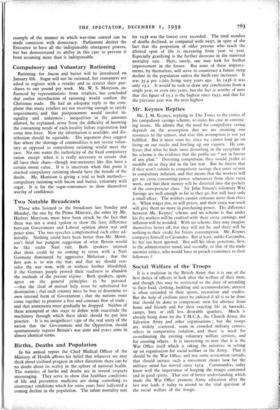Mr. Keynes Replies
Mr. J. M. Keynes, replying in The Times to the critics of his compulsory savings scheme, re-states his case in convinc- ing terms. He admits that the need for compulsory saving depends on the assumption that we are straining our resources to the utmost, and that this assumption is not yet fulfilled. But it must soon be, since we cannot long go on living on our stocks and bottling up our exports. He con- fesses that what he finds most disturbing in the reception of his scheme is the evidence that the public are " not in favour of any plan." Detesting compulsion, they would prefer to muddle on as they did in the last war. But he insists that if they won't submit to compulsory savings they must submit to compulsory inflation, and that means that the workers will get no extra consuming-power whatsoever from their extra work, and that their money will be diverted into the pockets of the entrepreneur class. Sir John Simon's voluntary War Savings are well enough so far as they go, but will have only a small effect. The workers cannot consume more than there is. When wages rise, so will prices, and their extra war-work will give them no more in purchasing-power. The difference between Mr. Keynes' scheme and no scheme is that under his the workers will be credited with their extra earnings, and inflation will be avoided. With no scheme, they may imagine themselves better off, but they will not be, and there will be nothing to their credit for future consumption. Mr. Keynes compares himself to Cassandra. But at least, unlike Cassandra, h..!. has not been ignored. But will his ideas penetrate, first, to the administrative mind, and secondly, to that of the trade unionist critics, who would have to preach economics to their followers ?












































 Previous page
Previous page